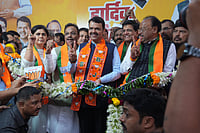***

Fervour, it is very clear, from the discussions around pan shops and grocery shops, or at the sarpanch's homes, or in village chaupals, is reserved for rising prices. Haryana villagers who are clueless about the nuclear deal have a litany of complaints about the impact of spiralling prices on their daily lives. "We don't dream of eating rice, except on Id. We put gur in our tea instead of sugar, there's no tadka on our daal, and we cook a hot meal just once a day," say the women of Ghasera mournfully. Many of the poorer Muslims in these parts say they have forgotten the taste of meat. Whose fault is it? Predictably, arguments about the impact of global crude oil prices cut no ice. "Reducing or increasing prices is the Centre's work. They have to take responsibility," says sarpanch Mitter Sain firmly. Rare are the village voices like Pillai's, in Vithura, who argues the petroleum price hike was inevitable in the face of the global spiral. Even in his village, others say there was still no call for increasing the price of lpg.
In Poulidoddi in Karnataka, villagers see the price rise as scarily all-encompassing. Says Doddabeeriah, a middle-aged farmer, "The price of the most essential item, salt, has gone up from Rs 4 to Rs 7 in the last 20 days or so. Cooking oil has jumped from Rs 52 to Rs 70." Diesel price rises have taken their toll, doubling the cost of transporting silk cocoons from their village to nearby Ramanagaram town, about 10 km away. But strangely, the price of transporting a bullock-cartload of sand has also gone up. Dolaiah, a villager, says the rate per cartload of sand has touched about Rs 200 and the rental charges for the cart around Rs 350 per day. This was at least 30 per cent lower 20 days ago.
People in rural Bengal know that globally, prices of oil and other items have risen, but why is the price of everything rising here, they ask angrily. "Not all commodities are imported from outside Bengal. Prices of commodities like potatoes, rice, vegetables, mustard oil, are going up, not because of the fuel price hike, but because the governments (at the Centre and the state) have failed to control and manage this price rise. Big businessmen and traders are making huge profits and no one is acting against them," says Shamshul. "The price of fish caught from the Hooghly nearby has nearly doubled. Why?" asks Mir Niyamat Ali. "We're on a forced vegetarian diet and nothing could be worse for fish-loving Bengalis," says Shyamal Kumar Rui Das, 31, a grocer of Daspara, making clear his sense of deprivation.
"Sign the deal, I say," says his wife Rita, "and concentrate on urgent matters like the price rise. If they (the Congress-led UPA) can't, let them quit. Things are getting out of hand." Even the long-suffering aam aurat is running out of patience.
















